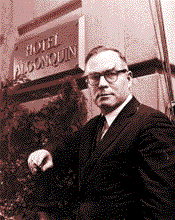 The Writer from
Mountain Home
The Writer from
Mountain Home
By Sandy Friedly
“My early book learning came to me as naturally as the seasons in … the little town in which I grew up. … Quite early I began to find a special charm in an unpeopled world … of lava rock and sagebrush desert. … I was often more purely happy at such times than I think I have ever been since.”—Richard McKenna, 1962
In 1963, the novel The Sand Pebbles won the $10,000 Harper Prize, spent 28 weeks on the New York Times’ Best-Seller List, was selected for the Book-of-the-Month Club and was serialized in the Saturday Evening Post. Three years later the movie version of the novel won nine Golden Globes and was nominated for eight Academy Awards.
But how many Idahoans know that The Sand Pebbles was written by a man who was born and reared in little Mountain Home, Idaho?
Richard McKenna is often forgotten because he didn’t begin writing professionally until his 40s, after spending many years in the Navy, only to have a deadly heart attack strike him in 1964, while he was working on his second novel. He was only 51 years old.
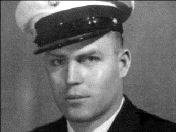 |
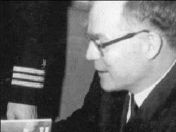 |
Those who are familiar with his work, however, know that McKenna was much more than a one-book wonder. He wrote short stories and essays and was a popular orator. Several years after his death, he won the Nebula Award for Science Fiction.
New Eyes for Old: Nonfiction Writings by Richard McKenna, a posthumously published collection of speeches, is a marvelous portrayal of McKenna, the scholarly sailor. Rich in metaphor and anecdote, the book reveals his wit, his humor and his passion for words. His speeches are great contributions to literary and academic societies for his insights on education and the process of writing.
McKenna was the personification of tenacity. The quintessential self-made man.
His life as a literary man began in his youth, when he discovered that the white-brick building he had passed each day on his way to school was not a courthouse, but a library.
Too poor to go to the theater, he regarded the Carnegie Library (now a museum) as a place filled with thousands of free “movies.” He read voraciously nearly every book inside, and when new books arrived the librarian hid them so he could have them first. He became an addict, a hopeless bibliophile.
Out of concern that too much reading might be harmful, his mother limited him to two books a week. But, as McKenna has written, he “never once thought of obeying her.”
Active in sports, debate and student politics, McKenna was an “A” student with a keen aptitude for science. After graduating from Mountain Home High School in 1930, he attended a year at the College of Idaho. But an exorbitant $50 tuition fee during the Depression forced him to bypass his education. To help support his mother and two younger brothers, he joined the Navy in 1931.
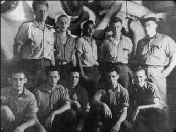 |
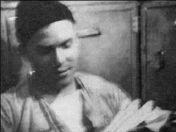 |
Working in greasy engine rooms as a machinist’s mate didn’t prevent McKenna from pursuing his education. He took correspondence courses and hid books in the nooks and crannies of ships “the way a squirrel hides acorns.” When the key was lost to a ship’s bookcase, he kicked in the glass. He simply had to read. When books weren’t available, he lined the bottom of his bunk with magazines. English poetry, he said, kept his mind “alive.” His favorite pastime was exploring Asian seaports for secondhand bookstores.
Like Jack London, he listened to the yarns of old salts and lived a wealth of experience from which to draw material for his writing. He would read and reread passages so he could wholly grasp the meaning between the lines. He studied words.
Near the end of his 22-year naval career, McKenna worked in a public-relations office writing features and news articles. He planned to retire to the Western desert and live in a Walden-like world, build a cabin and write. “I have always been most homesick for the desert,” he wrote a friend.
But someone urged him to enroll in the University of North Carolina. He told McKenna it was “a good place for a man with a purpose.”
So, in 1953, at the age of 40, McKenna became a student. He set out to learn as much as he could as fast as he could, wanting to make up for lost time. He wrote, “I have been trying to make every year count double in order to make up for my late start.”
He filled his academic agenda with literature and science—geology, botany and anthropology—never once including a creative-writing course. He earned straight “A”s in 40 subjects. In 1956 he graduated with a BA in English Literature, Phi Beta Kappa.
Shortly after graduation, he married Eva Grice, a UNC librarian. He moved into her Chapel Hill home and announced that he was ready to write, to pursue his long-awaited dream. After experiencing some rejections, he started selling short science fiction and fantasy stories to magazines. Then, his agent saw “a book in him” and he started a story on a much larger scale—The Sand Pebbles, which eventually became a 597-page epic.
The Sand Pebbles is set in revolutionary China in 1926. It’s about the crew of the San Pablo, a U.S. Navy gunboat whose mission is to protect Americans by patrolling a tributary of the Yangtze River. It’s about relationships, responsibility and religion.
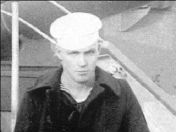 |
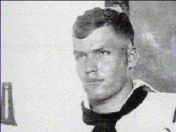 |
Although McKenna did not serve on a gunboat in China until the 1930s, he is known for his literary realism in his novel. Missionaries, businessmen and sailors who lived in China during the time in which the novel is set lauded him for his accurate descriptions and depicting “so fairly and correctly the attitudes of so many conflicting groups.”
To be a successful writer, McKenna needed what he called “creative isolation.” Once he rented an office without a phone, and not even his wife was allowed to disturb him. He locked himself in with a sandwich and a Thermos of coffee and smoked cigarettes all day long, seven days a week. He became “quite shaggy” for fear of disrupting the muse.
“A trip to the barbershop,” he once said in a speech, “would destroy a whole day for me. … I could almost envy a bald man.”
Idaho’s literary marquee is emblazoned with names like Ernest Hemingway and Vardis Fisher in large, bold characters, but “McKenna” remains in ghostly shades of gray. While Hemmingway wasn't even a native, and lived here only briefly, McKenna was born, raised and educated in the Gem State. Yet he's been neglected.
Until now, that is.
Mountain Home English instructor Jose Madarieta teaches at the newly named Richard McKenna High School, an alternative school formerly known as Academy 2000. He is establishing “a national archive for all things McKenna.”
“For some reason McKenna has never been properly recognized as one of the great Idaho authors,” says Madarieta, “and yet he is more Idahoan than those who get all the attention.”
With the help of School Board Chairman Jim Alexander and research assistant Shirley Leckta, Madarieta has contacted McKenna’s relatives and even a few of his friends. So much has been collected to build a repository that people now seek them out for information. The Naval Historical Society has requested a photograph of McKenna wearing his uniform.
When McKenna’s wife died, she left her estate to her sister, Louise Crain. After discussing it with her family, Crain decided to donate more items to the archive. She invited Madarieta to her home in Chapel Hill, N.C., to “sift through things.”
After receiving a $1,000 Teacher Incentive Grant from the Idaho Humanities Council, Madarieta flew across the country to retrieve McKenna’s effects. He has brought the lion’s share home to Idaho.
His haul includes everything from the original The Sand Pebbles manuscript to letters to books to photographs. Examining the hundreds of pounds of materials will be a prodigious task.
Richard McKenna has been compared to Melville and Kipling. Those who knew him and those who study his work believe that, had he lived longer, he would have been another Hemingway (a great influence, according to McKenna himself).
“People wanted more,” says Madarieta, who has added McKenna to his class curriculum. “They were not ready for him to go.”
McKenna returned twice to his hometown, to his desert of rocks and sagebrush, his “Walden.” Now, in a sense, he is coming home to stay, his legacy never again to be forgotten. In the minds of the students at the Richard McKenna High School, he will live on forever as a man who never gave up on his dream.
Formal dedication of the Richard C. McKenna High School takes place April 23 at 1:00 p.m. Louise Crain and her husband James will be in attendance, as will many dignitaries, including Rick Ardinger, director of the Idaho Humanities Council; internationally recognized Americanist Dr. Louie Attebery; State Historical Society Director Emeritus Arthur Hart; and the director of BSU Special Collections, Alan Virta. A reception and private screening of The Sand Pebbles will follow the dedication.
Source: Boise Weekly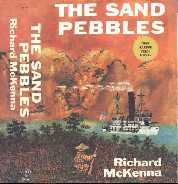
Winner of the 1963 Harper Prize Novel Contest
THE JUDGES:
Louis Auchincloss
Elizabeth Janeway
Philip Roth
"What I like about The Sand Pebbles," writes Elizabeth Janeway, one of the distinguished judges of the Harper Prize Novel Contest, "is its vitality and scope, its vivid sense of life and time and place; the way it gets outside people's minds and into what happened. McKenna has done a particular kind of thing and done it brilliantly-written about how the world works and done it as a novelist should, by recreating a bit of the world (a fresh bit) and showing us how it operates."
The scene is China
in the 1920's. For years the U.S. Navy gunboat San Pablo, an
absurdly ancient relic of the Spanish American War, has been patrolling
the far reaches of Hunan on a tributary of the Yangtze River, "showing
the flag" and protecting the lives and property of American
missionaries and businessmen from the attacks of bandits and rival war
lords. To her devoted crew of Sand Pebbles, long accustomed to having
her unofficial Chinese crew do all the hard work, the San Pablo has
become a privileged way of life, the softest berth in the Navy. To her
dedicated and able commanding officer Lieutenant Collins, she is an
instrument not only of American policy and power but of his own pride
and patriotism.
The arrival of Jake Holman, a maverick and a loner whose only love is
engines, poses a shipboard challenge to the Sand Pebbles and their
skipper. But something about San Pablo touches Holman, and for
the first time in his life he makes a few genuine friends--sharing wild
waterfront liberties, the excitements of summer cruises. He meets the
only girl he could ever respect und love, Shirley Eckert, of China
Light Mission. Through her and Po-han, the devoted engine-room coolie,
he gains an appreciation of China and its people and discovers a world
of humanity and promise he has never known.
Then suddenly San Pablo, China Light, and all their lives are
threatened by a new and irresistible force--the great Chinese
revolution. In the ensuing months the situation becomes bewildering,
precarious, ugly, and finally explodes in a tremendous climax in which
each individual is faced with startling revelations about himself and
the world he accepted, and is forced to make agonizing decisions.
This is Jake Holman's story. Like For Whom the Bell Tolls it
is the story of a country in torment, of believable men and women torn
by old loyalties and new values in alien surroundings, vividly brought
to life. It is a story of violence and humor and tenderness and tragedy
and courage, and it holds the reader engrossed and involved from the
first line to the last.
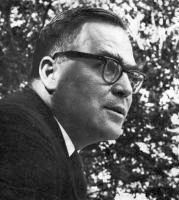
RICHARD MCKENNA was
born, grew up and went to school in the small desert town of Mountain
Home, Idaho. In 1931, at the age of eighteen, he enlisted in the Navy
and served for ten years in the Far East, two of them on a Yangtze
River gunboat. During this time he heard many firsthand accounts of the
1925-1927 Chinese Revolution which he has put to use in The Sand
Pebbles.
Mr. McKenna, a machinist's mate, served in World War II on a large
troop transport operating in all oceans, and stayed on through the
Korean War on a destroyer. In 1953 he retired from the Navy after
twenty-two years of service and entered the University of North
Carolina. He received his degree in English in 1956, promptly married
one of the university librarians and settled down in Chapel Hill to
become a writer. He has written short stories for the Saturday
Evening Post, Argosy and other magazines. The Sand
Pebbles is his first novel.
Source: The Sand Pebbles -
Harper and Row 1962
-
Links to:
- The
University of North Carolina - Chapel Hill
Southern Historical Collection #4516
Richard M. McKenna Papers Inventory
- McKenna
Biography by S. Stephens
- Brothers
Judd book review on the Sand Pebbles
- The Enlisted Force's Scribe
Trying to find and purchase a used copy of The Sand Pebbles? BookFinder is an excellent search engine for information on used book dealers, available copies and prices.
This classic novel was recently reprinted by BlueJacket Books (at an affordable price) and can be found at the Amazon.com site.
The electronic (eBook) version of this epic novel is available for sale and download from RosettaBooks.